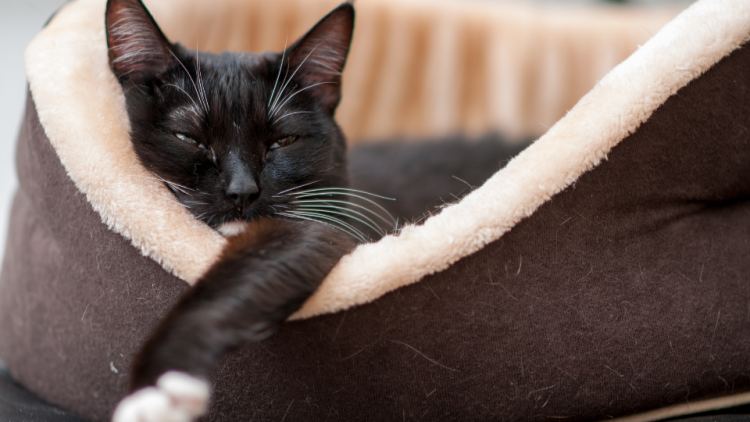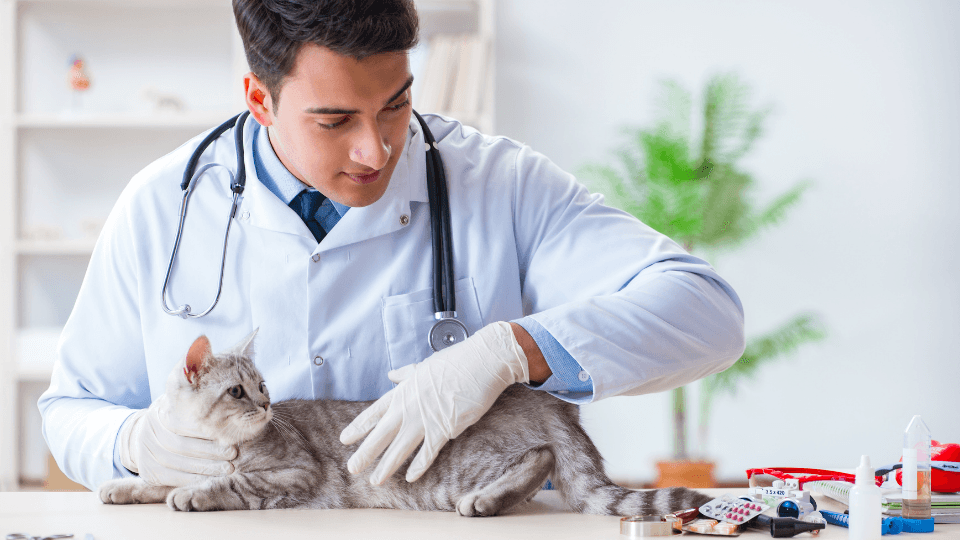Although oftentimes confused with intestinal worms, Giardia is actually a protozoan parasite that infects the GI tract of humans and pets. The illness is not very common in cats, but it can be quite difficult to treat.
In this post, we’re discussing the most common symptoms of Giardia in cats, how it’s spread, what treatment options are available, and more.
Table of Contents:
- What is Giardia?
- Cat Giardia transmission
- Symptoms of Giardia in cats
- Diagnosing Giardia in cats
- Giardia in cats treatment
- Recovery and management
- How to prevent Giardia
- Key Takeaways
Pro Tip: Some pet insurance plans cover conditions like parasites including Giardia, heartworms, fleas, ticks, and tapeworms, as long as the condition is not pre-existing and preventative measures have been taken.
What is Giardia?
Giardiasis is an infection in the intestines caused by the protozoan parasite Giardia. This single-celled parasitic species is not to be confused with the common intestinal parasites: hookworms, tapeworms, and roundworms. Giardia is more common in kittens, older cats, as well as cats with weakened immune systems, and can be easily transmitted among groups of felines in places like pet stores and animal shelters.
Cat Giardia transmission
Giardia cysts are shed and can be found in the feces of an infected cat. These cysts are quite resistant and can survive several months, especially in damp environments and water.
Cats become infected when they swallow Giardia cysts. This can happen if they come into contact with infected feces, if they play or roll in contaminated soil, if they drink water from a contaminated body of water like a pond or creek, or if they lick their body after contact with a contaminated surface (for example, cage or litter box).

Once the cat swallows a Giardia cyst and it enters the digestive system, the cyst will attach itself to the intestinal wall and pass in the feline’s feces about five to 16 days later.
Due to the fact that the Giardia cysts survive in high humidity environments, the infection is more easily spread in crowded spaces like animal shelters.
Can Giardia spread to humans?
There’s a human form of Giardiasis which is also caused by drinking contaminated water. However, there are several strains of Giardia, and felines typically have strain F which is not infectious to people. This means that it’s very rare for people to get infected with Giardiasis from their cats.
Still, in rare cases, cats can get infected with type A or B, which is infective to humans. For this reason, cat owners should always wash their hands well after cleaning litter boxes or handling an infected pet.
Symptoms of Giardia in cats
Many infected felines are asymptomatic, which means they don't show any symptoms of illness. On the other hand, symptoms of Giardia can also mimic other intestinal diseases, such as cancer and inflammatory bowel disease.
Kittens, senior cats, cats with compromised immune systems, cats that are stressed, or are housed in overcrowded spaces are more likely to show signs of disease.
The most common clinical sign of Giardia is chronic diarrhea, which can be intermittent or continuous and have an unusual color or contain mucus. Other symptoms include vomiting, weight loss, and decreased activity. In more severe cases, cats might become lethargic and dehydrated.
Diagnosing Giardia in cats
Giardia can be detected through a fecal flotation test, i.e. a microscopic examination of a stool sample. In some cases, the parasites might be seen on a direct smear of the feces. If your vet suspects your cat has Giardia, they might also test the animal's feces or blood for specific antigens of Giardia.
Giardia in cats treatment
Giardia can be difficult to treat as some strains are resistant to medication. The typical treatment is Metronidazole, which infected cats need to take for five to seven days. Your veterinarian might also prescribe another similar medication, such as Fenbendazole, which is taken orally for three to five days. In some cases (for instance, when the cat’s diarrhea is persistent and doesn’t respond to treatment), the vet might give these two medications in conjunction.
Supportive therapy, such as a highly digestible diet, might be recommended to help with diarrhea. If your cat has had diarrhea for a longer period of time, they might become dehydrated, so be sure they’re drinking enough water.

Because Giardia can be asymptomatic, cats that are more at risk of contracting it (kittens and older cats) should be tested. In addition, if your feline companion spends time outdoors, annual testing is recommended.
Pro Tip: If you suspect your cat is infected with Giardia, there will be expenses for diagnosing and treating the disease. Some pet insurance policies cover the entire visit for external and internal parasites, including the exam fee, diagnostic testing, and treatment.
Recovery and management
In most cases, the prognosis for cats with Giardia is good. Kittens, senior cats, and cats with compromised immunity are more likely to die from the infection.
The sooner the infection is diagnosed and treatment is started, the higher the chances for fast recovery. Typically, it takes three to five days for the parasite to be cleared and five to seven days for clinical signs to resolve.
It’s very important to follow your vet’s instructions when it comes to administering the prescribed medications. Even if your kitty seems to feel good and stops showing symptoms midway through treatment, the entire prescription needs to be completed.
How to prevent Giardia
Giardia is difficult to eliminate from the environment, but there are certain things you can do to reduce the chances of your pet getting infected and keeping yourself and your family safe.
- Promptly remove feces from your backyard and other outdoor spaces.
- Remove any containers of water and limit your pet’s access to stagnant water bodies.
- Change litterboxes frequently.
- Clean and disinfect potentially contaminated items like litter boxes, toys, bedding, and food and water bowls regularly for as long as your cat is sick. Use a 30:1 solution of chlorine bleach for litter boxes and steam cleaning for all the surfaces where Giardia cysts may be present.
- To avoid reinfection, wash your cat frequently and keep them isolated until all clinical symptoms have cleared up.
- If you have other pets in the household, be sure to notify your vet, even if they aren’t showing any symptoms. Bathe all the pets in the household with pet shampoo following medical treatment to make sure their coat is free of feces.
Key Takeaways
- Giardiasis is an intestinal infection that is caused by the protozoan parasite known as Giardia. Typically, cats get infected by ingesting the infectious cysts shed by another animal through its feces.
- Symptoms of Giardia are more apparent in kittens, older cats, and cats with weakened immunity. The most common clinical sign of Giardia is diarrhea, but you may also notice vomiting, weight loss, and lack of activity.
- Treatment is usually done on an outpatient basis. Prescription drugs and thorough bathing should be sufficient to remove the parasite from your pet's body and reduce the chances of reinfection.
- Early intervention is the best way to ensure fast recovery and prevent a widespread epidemic. If you suspect your cat has Giardia, contact your vet as soon as possible.
